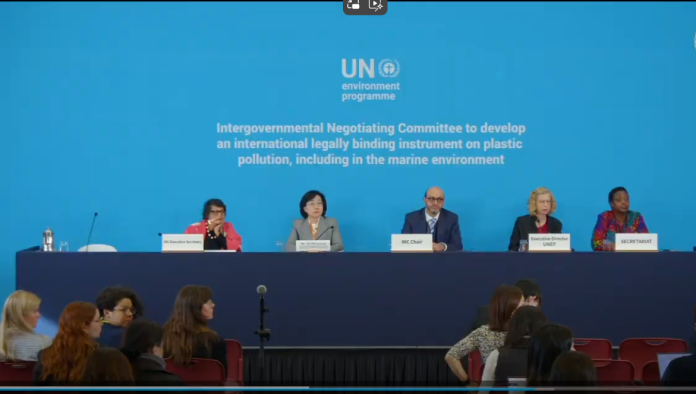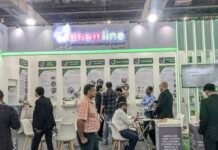
Not surprisingly, the negotiations at the fifth – and what was supposed to be the final – session of the Intergovernmental Negotiating Committee to arrive at a legally binding global plastics treaty (INC-5) ended in a stalemate with stakeholders deciding to meet again for INC 5.2 in 2025 for further talks.
More than 3,300 delegates – including members representing more than 170 nations and observers from more than 440 organizations – met in Busan in South Korea from 25 November to 1 December in mainly closed-door negotiations. INC-5 follows INC-1 in Punta del Este in November 2022, INC-2 in Paris in June 2023, INC-3 in Nairobi in November 2023, and INC-4 in Ottawa in April 2024.
According to reports and updates Packaging South Asia has been receiving from various sources in Busan, a sticking point has been the demand from anti-pollution campaigners to cut virgin plastic polymer production, plastic production and to regulate hazardous chemicals – which oil-and gas-producing countries such as Saudi Arabia and Kuwait have been vehemently opposing.
India clearly stated its inability to support any measures to regulate the production of primary plastic polymers, saying, “It has larger implications in respect of the right to development of member states.”
However, India admitted the hazards of plastic pollution and listed the measures it has taken to address the problem – a single-use plastic ban, an EPR regime on plastic packaging, a push for sustainable packaging, and reducing the use of virgin material. “Our approach to finalize the draft instrument should be based on mutual trust, cooperation, and the spirit of consensus,” India stated.
Campaigners say there was a lack of transparency in the negotiations, which they allege were held hostage by petro-states and like-minded lobbies. Sources closely observing the negotiations in Busan said the INC chair and member states were locked in closed-door talks while important stakeholders such as frontline communities, waste-pickers, and the Indigenous Peoples nations and groups were left out in the cold.
According to one report, more than 220 fossil fuel and chemical industry lobbyists registered for INC-5, the largest single group at the talks, which dwarfed every other delegation.
“The lack of transparency in these discussions sparked outrage, with many stakeholders questioning the legitimacy of decisions being made in closed-door settings. These decisions, after all, directly impact the lives of billions, particularly those in vulnerable communities. Yet, their voices were excluded in a process that seemed to prioritize political expediency over accountability,” writes Siddharth Ghanshyam Singh of Delhi’s Centre for Science and Environment in Down to Earth.
The text, seen by Packaging South Asia, defines terms such as plastic, plastic pollution, and plastic waste as well as refers to increasing levels of plastic pollution, including in the marine environment, and the serious environmental and human health problems it causes.
It stresses the importance of effective mechanisms throughout the plastic lifecycle to promote plastic circularity and prevent leakage of plastics in the environment while in the same breath –“Acknowledging the important role played by plastics in human society.”

Civil society groups, however, say the chair’s text falls short of expectations on core obligations such as plastic production and object to referring to a reduction target as “aspirational.” They also say the chair’s text has stripped away systematic controls on toxic chemicals and chemicals of concern.
Rahyang Nusantara, deputy director, Dietplastik Indonesia & Convenor of Asia Reuse Consortium, says the current text missed the opportunity to advance real solutions. The prospective agreement must have a dedicated article with ambitious reuse targets financed by a new and dedicated financial mechanism to enable the establishment, operations and scaling up of non-plastic reuse and repair systems, Nusantara says. “This is key for a safe and toxic-free just transition away from plastics to truly end plastic pollution.”
According to Joan Marc Simon, founder of Zero Waste Europe, the outcome can be seen both as a success and as a failure. “A failure because negotiators exhausted the allocated time and, whilst plastic pollution continues to increase, no agreement was found.”
However, the positive news is that the campaigners have succeeded in shifting the conversation to addressing the entire plastics lifecycle. “From pointing fingers at the victims of plastic pollution 10 years ago, the world is now discussing a treaty that goes to the root causes of plastic pollution,” Simon said, adding that the slow progress is because of the ‘delay and derail’ tactics by oil and plastic-producing countries.
Ana Rocha, Global Plastics policy director of the Global Alliance for Incinerator Alternatives (GAIA) – a worldwide alliance of more than 1,000 grassroots groups, non-governmental organizations, and individuals in over 90 countries – sums up the mood at the talks, “…The ambitious majority needs to do whatever it takes to get these negotiations back on track and reclaim the spirit of multilateralism. Now is not the time for timidity. It is time to fight for our collective survival.”
Explaining the delay in the negotiations, Inger Andersen, executive director of the UN Environment Programme (UNEP), says there is, “Persisting divergence in critical areas, and more time is needed for these areas to be addressed.”
While there is no denying that plastic and allied products are present in almost every sector be it packaging, pharma, FMCG, electrical and electronic equipment, or household products, and play an important role in our lives – the impact of plastic pollution on the environment, human health, and the socio-economic burden it causes, is too big to ignore. As such, there is an urgent need for all stakeholders to find a way out of one of the biggest crises of our times. Else INC 5.2 might just lead to INC 5.3 and so on…










